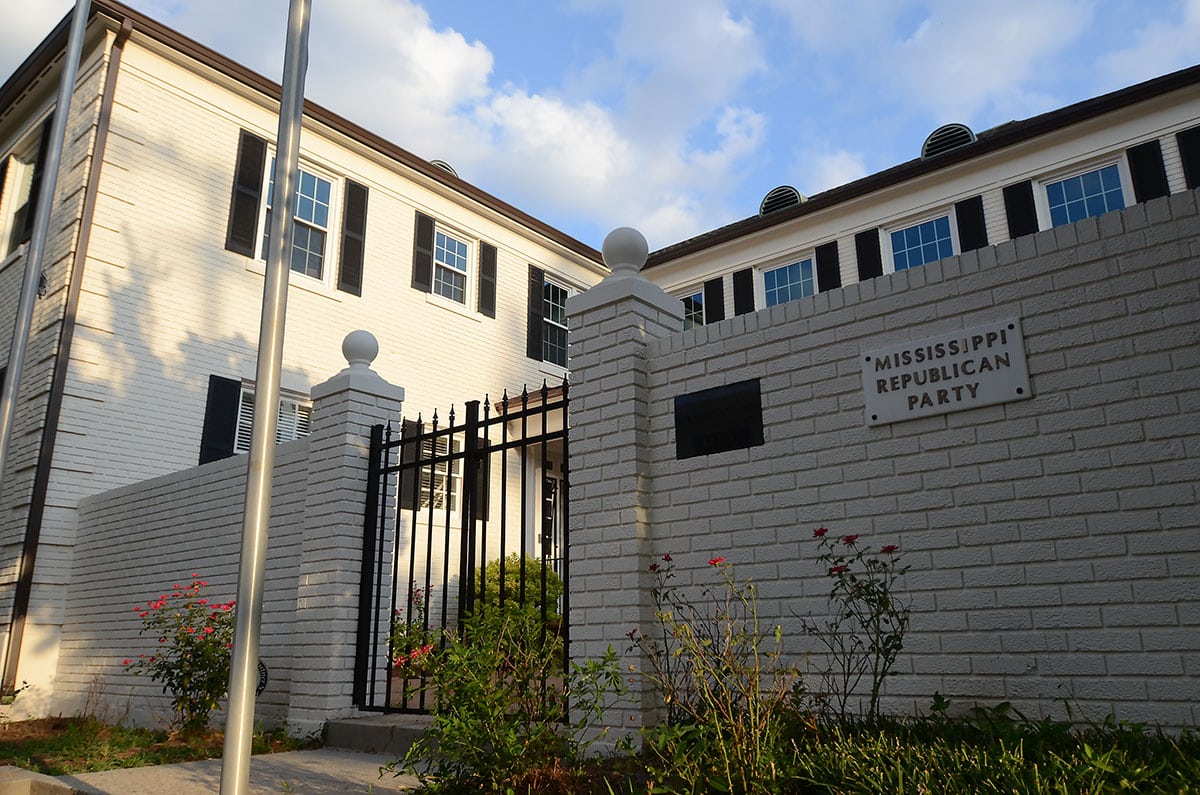Mississippi Today
State Republican Party raises fees for candidates to run for some public offices

If Mississippians want to qualify to run for state office as a Republican, they'll first have to open their wallets wider than ever.
Mississippi Republican Party leaders voted last year to increase candidate qualifying fees, the amount a candidate has to pay to run for office, to the maximum amount allowed under state law for all federal, statewide and regional offices in the state.
Mississippi GOP Chairman Frank Bordeaux told Mississippi Today the fee increase is comparable to the figure the Republican Party in other states requires for their candidates to run for office.
“This increase is a way for us to make sure we can continue to provide quality resources to our Republican nominees,” Bordeaux said.
The Democratic Party, on the other hand, opted to keep their fees the same as prior years.
Qualifying fees for all political offices, regardless of party affiliation, were previously spelled out in statute. But state lawmakers in 2022 voted to give political parties a range for how much they can charge candidates and allow the party leaders to choose the specific amount.
The minimum fee parties can charge gubernatorial candidates, for example, is $1,000, and the maximum amount is $5,000. The Democratic Party opted to keep their fee at $1,000, while the GOP decided to raise the fee to $5,000.
New GOP candidate qualifying fees:
- U.S. Senator: $5,000 (previously $1,000)
- U.S. Representative: $2,500 (previously $500)
- Governor: $5,000 (previously $1,000)
- Other statewide offices: $2,500 (previously $500)
- Transportation Commissioner: $2,500 (previously $500)
- Public Service Commissioner: $2,500 (previously $500)
- District Attorney: $250 (unchanged)
- State Legislature: $250 (unchanged)
Republican state Sen. Joey Fillingane of Sumrall argued in favor of the 2022 legislation during the legislative session and said at the time that the main reasons for the new law was to give parties more latitude to conduct their primary elections and ensure only serious candidates run for office.
“I think we had a situation not too long ago where maybe a truck driver put his name on the ballot, didn't campaign, didn't really run,” Fillingane said. “He was running his 18-wheeler truck and ended up winning a major party primary for a major office in Mississippi. And I think you can argue that was a direct result of having extremely low filing fees in that particular race.”
Fillingane was referring to Robert Gray, a truck driver who won the 2015 Democratic nomination for governor and was handily defeated by former Republican Gov. Phil Bryant.
Opponents of the recent legislation believed higher qualifying fees could bar candidates from running for office and deter a competitive democratic system.
The final version of the bill passed the House 84-31 and the Senate 33-10. Republican Gov. Tate Reeves signed it into law.
Bordeaux doubted increased fees would keep candidates from entering the Republican primary because serious candidates are usually able to raise larger amounts of money. He pointed to the state's recent gubernatorial election, when the Republican and Democratic nominees for the office collectively raised over $17 million this past year.
This is now the first time under the new law that the state Republican Party has raised its qualifying fees. The new fees will primarily impact the Mississippi's U.S. Senate race next year, when incumbent U.S. Sen. Roger Wicker is up for reelection.
Wicker, a Tupelo resident, has previously announced he's running for reelection. But two lower-profile candidates, Republican state Rep. Dan Eubanks of DeSoto County and retired Marine Col. Ghannon Burton, announced they intend to challenge Wicker in the Republican primary.
The qualification period for the U.S. Senate, according to the Secretary of State's website, opens on Jan. 2 and closes 10 days later on Jan. 12.
This article first appeared on Mississippi Today and is republished here under a Creative Commons license.
Mississippi Today
On this day in 1950


MAY 16, 1950

Twenty Black families from South Carolina filed the lawsuit, Briggs v. Elliott, the first direct attack on the validity of the “separate but equal” doctrine in public schools.
The litigation was later combined with the successful Brown v. Board of Education case. The litigation might never have happened if not for the Rev. Joseph A. DeLaine, who accepted the NAACP's call to challenge the school bus transportation practices in Clarendon County, where Black students had to walk up to 8 miles to school.
“I realize that the stand that I take may cost me my job as a school teacher, but we need men,” he wrote.
Property owner Levi Pearson had previously sued, asking that school buses be provided for Black students. After his lawsuit failed on technical grounds, Thurgood Marshall approached DeLaine, saying he needed families for litigation, or the NAACP couldn't go any further.
After gathering the signatures of 107 parents and their children, economic pressure and violence followed. Despite this, 17 adults signed the petition again, and the lawsuit moved forward to trial. Evidence showed that South Carolina spent $221 annually for each white student, but only $45 for each Black student. White children had modern schools with a teacher for every grade. Meanwhile, Black children studied in wooden shacks, reading textbooks discarded by white students.
As a result of their activism, the Pearson family saw boycotts of their timber, and the Briggses were fired from their jobs. So were DeLaine and his wife. They saw their home and church burned to the ground. They were forced to leave the state after a drive-by shooting. In 2003, the families of DeLaine, Levi Pearson and the Briggses received Congressional Gold Medals for their courage.
This article first appeared on Mississippi Today and is republished here under a Creative Commons license.
Did you miss our previous article…
https://www.biloxinewsevents.com/?p=358956
Mississippi Today
PSC axes solar programs in light of EPA funds, advocates file lawsuit
Advocates from some of the state's conservation groups — such as Audubon Delta, Mississippi Sierra Club and Steps Coalition — spoke out Wednesday against a recent decision by the Mississippi Public Service Commission to suspend several solar programs, including “Solar for Schools,” less than two years after the previous commission put them in place.
“This is particularly disappointing because the need for these incentives in the state of Mississippi is significant,” said Jonathan Green, executive director of Steps Coalition. “Energy costs in the South, and in particular the region known as the Black Belt, are higher than those in other parts of the country for a number of reasons. These regions tend to have older energy generation infrastructure, and housing that has not been weatherproofed to modern standards. For many low- to moderate-income residents in the state of Mississippi, energy burden and energy insecurity represent real daily economic challenges.”
The PSC voted 2-1 at its April docket meeting to do away with the programs, reasoning in part that new funds through the Inflation Reduction Act would be available to the state. About 10 days later, the Environmental Protection Agency awarded $62 million to the state, through the Hope Enterprise Corporation, to help low-income Mississippians afford adding solar power to their homes. The funds are part of the Biden Administration's Solar for All program, one of the several recent federal initiatives aimed at reducing greenhouse gas emissions.
The PSC decision ended three programs the previous commission put in place to encourage wider adoption of solar power through the two power companies it regulates, Entergy Mississippi and Mississippi Power: “Solar for Schools,” which allowed school districts to essentially build solar panels for free in exchange for tax credits, as well as incentives for low-income customers and battery storage.
Last Friday, the Sierra Club filed lawsuits in chancery courts in Hinds and Harrison counties against the commission, arguing the PSC broke state law by not providing sufficient reasoning or public notice before making the changes. Advocates also argued that new funding going to Hope Enterprise won't go as far without the PSC's low-income incentives.
The programs were part of a 2022 addition to the state's net metering rule, a system that allows homeowners to generate their own solar power and earn credits for excess energy on their electric bills. Mississippi's version is less beneficial to participants than net metering in most states, though, because it doesn't reimburse users at the full retail cost. Mississippi's net metering program itself is still in tact.
Northern District Commissioner Chris Brown said that, while he supported efforts to expand solar power, he didn't think programs that offer incentives from energy companies were fair to other ratepayers.

“It's the subsidy that we take issue with,” Brown said at the meeting. “It's not the solar, it's not the helping the schools. We just don't think it's good policy to spread that to the rest of the ratepayers.”
Brown and Southern District Commissioner Wayne Carr voted to end the programs, while Central District Commissioner De'Keither Stamps voted against the motion. All three are in their first terms on the PSC. Brown's position is in line with what the power companies as well as Gov. Tate Reeves have argued, which is that programs like net metering forces non-participants to subsidize those who participate.
Robert Wiygul, an attorney for the Mississippi Sierra Club, countered that argument during Wednesday's press conference, saying that net metering actually helps non-participants by adding more power to the grid and reducing the strain on the power companies' other infrastructure. Moreover, he said, the PSC hasn't offered actual numbers showing that non-participants are subsidizing the program.
“Look, if the commission wants to talk about that, we are ready to talk about it,” Wiygul said. “But what we got here is a situation where these two commissioners just decided they were going to do this. We don't even know what that claim is really based on because it hasn't been through the public notice and hasn't been through the public comment process.”
While no schools had officially enrolled in “Solar for Schools,” which went into effect in January of last year, Stamps told Mississippi Today that there were places in his district getting ready to participate in the very programs the PSC voted to suspend.

“My issue was we should have talked to the entities that were going through the process to (understand what they were doing) to participate in the programs before you eliminate the programs,” he said.
Several school districts in the state are already using solar panels thanks to funding from a past settlement with Mississippi Power. Officials there told Mississippi Today that the extra power generated from the panels has freed up spending for other educational needs. During the public comment period for the 2022 net metering update, about a dozen school district superintendents from around the state wrote in to support the initiative. Ninety-five school districts in the state would have been eligible for the program because they receive power from Entergy Mississippi or Mississippi Power.
Former commissioner Brent Bailey, who lost a close reelection bid in November to Stamps, was an advocate for the schools program that the PSC created while he was there. At the April docket meeting, he pleaded with the new commission to reconsider, arguing that the new federal funding won't have the same impact without those programs.
“My ask is to at least give this program a chance, see where it goes, and hear from stakeholders that have participated,” Bailey said. The solar programs, he added, weren't just about expanding renewable energy, but taking advantage of a growing economy around solar power as well: “We can just stand by and watch it go by, or we can participate in this and bring economic development to the state.”
This article first appeared on Mississippi Today and is republished here under a Creative Commons license.
Crooked Letter Sports Podcast
Podcast: In or out (of the NCAA Tournament)?

College baseball's regular season is in its last week, which means baseball bracketology is a popular activity. State needs to finish strong to become a Regional host. Southern Miss probably has already punched its ticket as a 2- or 3-seed. Ole Miss, playing its best baseball presently, needs victories, period. Meanwhile, the State High School softball tournament is this week in Hattiesburg, and the state baseball tournament comes to Trustmark Park in Pearl next week.
Stream all episodes here.
This article first appeared on Mississippi Today and is republished here under a Creative Commons license.
Did you miss our previous article…
https://www.biloxinewsevents.com/?p=358148
-
SuperTalk FM3 days ago
Martin Lawrence making 3 stops in Mississippi on comedy tour
-
Our Mississippi Home2 days ago
Beat the Heat with Mississippi’s Best Waterparks
-
Mississippi Today6 days ago
Lawmakers may have to return to Capitol May 14 to override Gov. Tate Reeves’ potential vetoes
-
Mississippi News7 days ago
Man arrested for allegedly breaking into home, robbing owner
-
SuperTalk FM7 days ago
Couple arrested after husband received unemployment benefits while in prison
-
Mississippi News Video5 days ago
Local dentists offer free dental care in Amory
-
Our Mississippi Home3 days ago
Charlie’s U-Pik: Opening Soon for the Summer Season
-
Mississippi News6 days ago
Bond set for West Point couple accused of killing their child








































